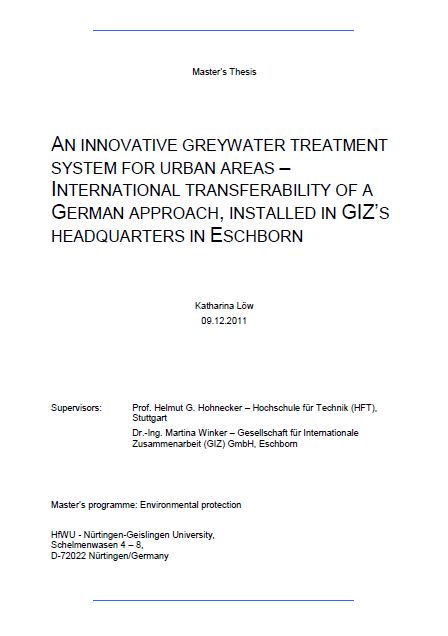An innovative greywater treatment system for urban areas - International transferability of a German approach, installed in GIZ's headquarters in Eschborn
Löw, K. (2011)

Published in: 2011
Author:
Löw, K.
Uploaded by:
SuSanA secretariat
Partner profile:
Deutsche Gesellschaft für Internationale Zusammenarbeit (GIZ) GmbH
6197 Views
245 Downloads
Location of library entry
Content - Summary
In its German headquarters in Eschborn, GIZ installed a greywater treatment system within the research project SANIRESCH. It is based on membrane bioreactor (MBR) technology designed by HUBER SE. Greywater is domestic wastewater excluding toilet water, therefore easily recyclable. Within this work the international transferability of this technology was investigated.
Greywater characteristics and legal foundations were obtained by literature study. Different treatment methods were compared and an investigation of existing MBR projects was conducted. The SANIRESCH plant was described and evaluated according to its economic aspects in comparison to a standard application in a hotel. By means of a utility analysis, based on the fundamentals of sustainable sanitation, the potential for international transferability was assessed to detect the crucial issues.
In summary, MBR technology for greywater treatment provides an excellent cleaning performance with minimal space requirement, but relatively high energy demand. For office buildings, an economic benefit is rarely achieved, caused by an unfavourable water balance. While residential buildings show beneficial water balance and reimbursement is attainable. Concerning worldwide transferability, environmental aspects based on water scarcity as an indicator criterion, 32 countries were assessed. Due to water shortage, poor water quality, high population density and high urbanisation rate, the MENA region was identified as hotspot.
Bibliographic information
Löw, K. (2011). An innovative greywater treatment system for urban areas - International transferability of a German approach, installed in GIZ's headquarters in Eschborn.
Filter tags
English Europe & Central Asia Greywater or wastewater Urban (entire city)















